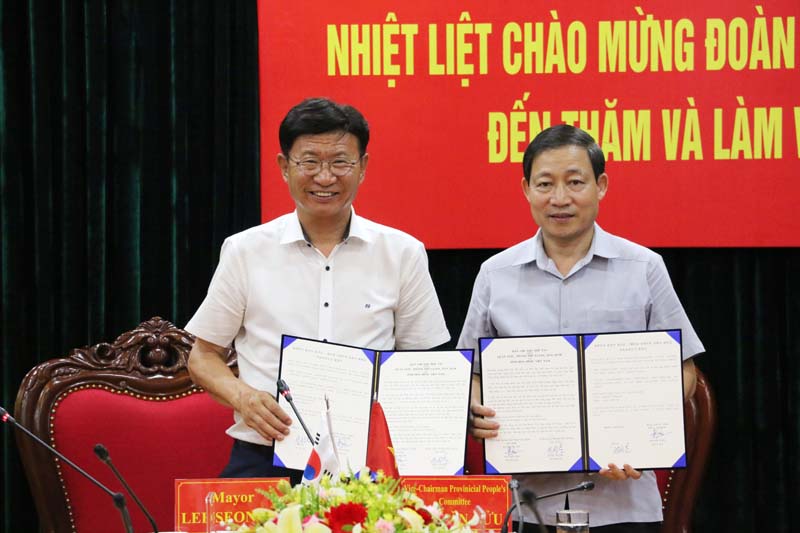
(HBO) – A delegation led by Mayor Lee Seon-ho of Ulju county of Ulsan city, the Republic of Korea (RoK), visited Hoa Binh province on July 3. Bui Van Cuu, member of the provincial Party Committee’s standing board and Vice Chairman of the provincial People’s Committee, along with other local officials had a working session with the delegation.
 Vice Chairman of the Hoa Binh
provincial People’s Committee Bui Van Cuu and Mayor Lee Seon-ho of Ulju county
of the RoK’s Ulsan city signed a memorandum of understanding on cooperation in
multiple fields, including economy, culture and education.
Vice Chairman of the Hoa Binh
provincial People’s Committee Bui Van Cuu and Mayor Lee Seon-ho of Ulju county
of the RoK’s Ulsan city signed a memorandum of understanding on cooperation in
multiple fields, including economy, culture and education.
Welcoming the delegation, Vice Chairman of the
Hoa Binh People’s Committee Bui Van Cuu said Vietnam and the RoK are
Asian-Pacific countries with bilateral friendship dating back many years. The
RoK has become a leading partner of Vietnam and now ranks second among foreign
investors in the country. It has also invested in many projects in Hoa Binh.
Ulju county and Hoa Binh province share many
similarities, which are favourable for them to boost comprehensive cooperation,
thereby helping to promote each locality’s economic development, he noted.
For his part, Mayor Lee thanked the province for
its warm welcome for his delegation. He also informed the host officials about
Ulju county’s economic and cultural situation.
He expressed his hope that Ulju and Hoa Binh
will reach consensus on cooperation for common development.
At the working session, the two sides signed a memorandum
of understanding on collaboration. Accordingly, they will step up multifaceted
ties, including in economy, education and culture, on the basis of equality and
mutual benefit.
During their working trip to Hoa Binh, the Ulju
delegation also visited the Hoa Binh Hydropower Plant and the Muong Cultural
Space Museum.
Hoa Binh province is undergoing a dynamic transformation amid Vietnam’s national digital transition. Building on Poliburo’s Resolution No. 57-NQ/TW on breakthroughs in science, technology, innovation, and national digital transformation, the province has rolled out a wide range of practical action plans. A standout initiative is the "Digital Literacy for All” movement, an effort to ensure that no one is left behind in the digital era.
Hoa Binh province is undergoing a dynamic transformation in the wake of the national digital transformation movement. Building on Resolution No. 57-NQ/TW of the Politburo on breakthroughs in science, technology, innovation, and national digital transformation, the province has implemented a wide range of practical action plans. A standout initiative is the "Digital Literacy for All” movement ambitious effort to ensure that no one is left behind in the digital age.
With a spirit of unity and proactive problem-solving, the Party Committee, the government and the people of Dong Lai Commune (Tan Lac District) have made great strides in implementing the resolutions of the 24th Party Congress of the commune for the 2020 - 2025 term. Focusing on leadership and practical actions, the commune has brought the Party’s resolutions into daily life, creating strong impacts and pushing the local development forward.
Amid the nationwide push for digital transformation, young people in Hoa Binh Province are stepping up as dynamic pioneers, applying technology to enhance Youth Union operations and expand the reach of youth-led initiatives. Through creativity and adaptability, Youth Union organizations at all levels have introduced a series of practical solutions, contributing to modern governance and community development.
In recent years, An Nghia commune, located in Lac Son district, has stepped up administrative reform, focusing on improving the quality and efficiency of its single-window service unit for receiving and processing administrative procedures. These improvements have helped create favourable conditions for local residents and organisations to handle administrative procedures, contributing to the commune’s broader socio-economic development.
The Prime Minister-approved master plan to develop the multi-use value of forests ecosystems through 2030, with a vision to 2050, aims to improve the management and sustainable use of forest resources, create jobs, increase incomes, and improve the living standards of ethnic minorities, people in mountainous and remote areas, forest workers and those living near forests.



 Vice Chairman of the Hoa Binh
provincial People’s Committee Bui Van Cuu and Mayor Lee Seon-ho of Ulju county
of the RoK’s Ulsan city signed a memorandum of understanding on cooperation in
multiple fields, including economy, culture and education.
Vice Chairman of the Hoa Binh
provincial People’s Committee Bui Van Cuu and Mayor Lee Seon-ho of Ulju county
of the RoK’s Ulsan city signed a memorandum of understanding on cooperation in
multiple fields, including economy, culture and education.